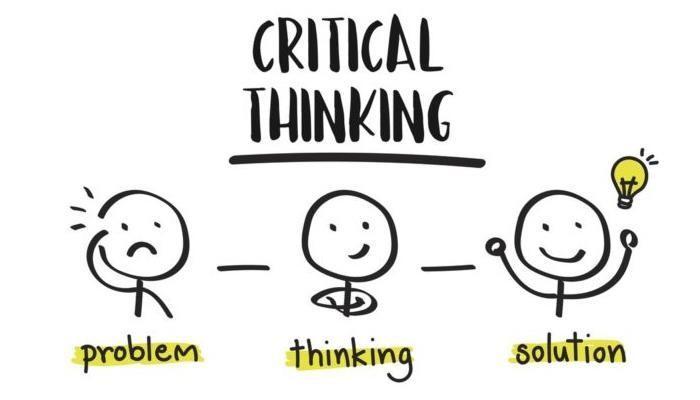Develop Critical Thinking Skills in Child
The world is evolving faster than ever before. Technological advancements, global events, and changing environments now influence people’s lives more directly. Consequently, you need to prepare your child by developing important skills such as critical thinking, problem-solving, and decision-making in them. In this article, we shall explore certain techniques and practical ideas such as think-outside-the-box games for your child. You can introduce them to your child as they significantly improve their decision-making skills and other life skills.
Thinking beyond the obvious is an essential life skill. It helps us understand people and situations better. Moreover, it makes us aware of the possible outcomes of our actions or decisions. Many times, we forget to improve such real-world skills in our children and instead focus only on their academics.
If you want to develop important critical thinking skills in your child and have a productive time together, playing a think-outside-the-box game can be a great idea. It can be immersive as well as can help you improve decision-making in the child.
Before exploring different tips and think-outside-the-box games to develop critical thinking skills and improve decision-making in children, we shall answer some of the frequently asked questions about the topic.
How to develop critical thinking skills and improve decision-making in a child?

\ Image Source: theasianschool.net
Allowing your child to solve simple problems that you come across together and playing a think-outside-the-box game every day can do wonders.
Think-outside-the-box games are a great way to improve decision-making skills in your child. These games require patience, observation, concentration, and problem-solving skills. Moreover, they can help them lead a healthier lifestyle, away from smart devices and social media for some time, and polish their problem-solving skills.
However, you may find it difficult to effectively do this daily since your child would prefer to play video games or use social media.
Children barely get the opportunity to solve important problems in real life.
We should allow them to make small decisions at times. Through their errors and observations, they will begin to look at things more critically.
Thus, you can develop their skills in facing both real-life and academic problems.
You can use many other techniques in your daily life to significantly enhance critical thinking and improve decision-making in children.
How can a think-outside-the-box game help develop critical thinking in your child?
You can start by developing a habit of playing and practicing questions, engaging in puzzles, and think-outside-the-box games to help improve decision-making in the child.
Unlike video games on computers or smartphones, these think-outside-the-box games can be educational as well as fun. They are also a creative way to make your child’s indoor playtime more productive and interactive.
A think-outside-the-box game can be any form of puzzle, board game, problem-play, or virtual problem-solving game.
Let us have a look at 25 Tips and Tricks that can help you enhance critical thinking and improve decision-making in a child.
Activities and think-outside-the-box Game Ideas for Improving Critical Thinking in Kids
- Discuss daily activities:
Talking about daily activities is something most parents are encouraged to do. It encourages your child to think about how each other’s life and responsibilities are different. Additionally, you can talk about the reasons why we do each of our daily activities. This will help a lot to enhance your child’s critical thinking skills.
- Teach your child about Cause and Effect:
You can teach them about Cause and Effect through thought exercises. For example, you can tell them how each action or decision of ours has an effect. Also, explain the reasons for events that happened so that they can understand that there is a cause behind everything.
- Encourage your child to ask “Why?” and “How?”:
Most often, studying from textbooks limits our children to repeatedly reading definitions. Hence, we should promote asking our children to find out the “Why?” and “How?” behind topics. You can ask them these questions as you and your child come across suitable situations.
- Share Each Other’s Thought Processes:
Sharing thought processes about household, games, or outdoor matters can be a healthy way to inculcate critical thinking in your child. When you share the thought process behind your decision-making, your child can observe and understand the logical reasons behind them. And when your child shares their thought process, you can have a better understanding of where to correct and appreciate.
- Step in only when your intervention is needed:
You do not have to step into every action of your child. If you allow them to observe and solve problems for themselves, they will soon become highly skillful at critical thinking.
- Follow-up questions:
Ask your child follow-up questions when they come up with solutions for problems. Or, when they say a statement, ask them “how?” and “why?” they know it/think so. This will help them understand the importance of backing up conclusions or statements with reason.
- Make your child understand that each person has their views:
While it is important to understand that we need to have a reason behind our actions or decisions, it is also important that each person has their reason to say or do things. This comes as a part of understanding each of our separate existence and independent minds.
- Let your child hypothesize:
Before presenting them with conclusions or solutions, allow your child to hypothesize. Besides, you can also make them think of hypothetical situations and be imaginative about them. This will encourage independent thinking and reasoning in your child.
- Inspire creativity:
Make your child draw pictures to represent his/her thoughts. We actually require critical thinking skills to represent our thoughts as pictures! Also, you can inculcate storytelling, poetry-writing, and play-acting to develop creativity and thereby critical thinking skills in your child. - Let Your Child Explore:
Allow your child to explore, so that they can find themselves and make simple decisions. This is the best and the most natural way you can improve decision-making in a child.
- Help Your Child Put Forward Suggestions:
Whether you and your child are outdoors or at the house, ask your child for suggestions for simple decisions. They can help your child practice making decisions by understanding what is and what is not suitable when you are in a situation.
- Motivate Them to Think in New and Different Ways:
There are always multiple possibilities for how many things can occur. You can explore them along with your child. Thus, you can develop curiosity and critical thinking in your child to consider more possibilities while making decisions.
- Help Your Child Find Out More Information:
It is important to give your child more time and space to find more information when you ask them for suggestions or decisions. Always let them know the importance of doing ample study before concluding or finalizing decisions.
- Make Your Child Compare & Contrast:
When your child is choosing between products, movies, or destinations for the summer holidays, ask them to compare the choices. As a result, your child’s logical reasoning and ability to make quick decisions can be enhanced significantly.
- Ask Your Child for a Conclusion:
It is important to not leave topics or discussions halfway through. When your child provides an answer or tells a story, ask them for a conclusion. If you help them reach a conclusion to their chain of thought, they will be able to understand their thought process. This can help them find faults or merits in their way of thinking and train themselves to be better at thinking critically.
- Play Problem and Pretend Games:
You can enact real-world situations and make your child solve a problem. It can help them learn how to face a challenge and consider multiple possibilities and outcomes before making decisions. Problem and pretend play is a classic example of a think-outside-the-box game that can help your child improve decision-making by training critical thinking and logical skills.
- Make your child read books that help build critical thinking skills:
Various books can improve decision-making skills in your child while being engaging to them. Make your child pick storybooks by famous authors or other thought-provoking books that inculcate critical thinking and curiosity.
- Guessing games:
Playing guessing games involving a limited number of questions to ask is a great way to practice critical thinking. Moreover, it is such a great think-outside-the-box game as it will make your child strategize well before coming up with a question.
- Detective games:
Playing detective games can help develop reasoning and observation skills in your child. It requires looking beyond the surface and making the right choices to unveil the answer.
- Play Riddles:
Riddles and puzzles are probably the oldest forms of think-outside-the-box games. It requires your child to find out the answer from beyond the obvious and gives an occasion for a fun conversation. You can ask them to ask you riddles or you can ask them riddles to improve your child’s problem-solving skills.
- Charades:
Charades is also another classic think-outside-the-box game that can help your child think critically and have a great fun time with friends or family.
- Recognizing and recalling activities:
You can include recognizing and recalling activities based on your child’s academics or experiences. They will have to identify representations or terms accordingly or match them to win the games. This is great since you can blend academics and life skills into a single game.
- Time Capsule:
You can ask your child to recall five things or characters from the last story they read and draw them in the way they imagined. It will encourage them to think outside the box as they have to suddenly recall the story and the events to remember the things involved in the story.
- Wordplay:
Wordplays are also a great way to make your child think outside the box. You can find a lot of wordplays across magazines. Besides, they require problem-solving skills and can hence improve decision-making skills in a child.
- Making a Menu:
Making a menu might sound simple, but it requires comparing and contrasting, and considering the groceries available or is to be used. It will not only improve important practical skills in your children but also critical thinking and decision-making skills.

